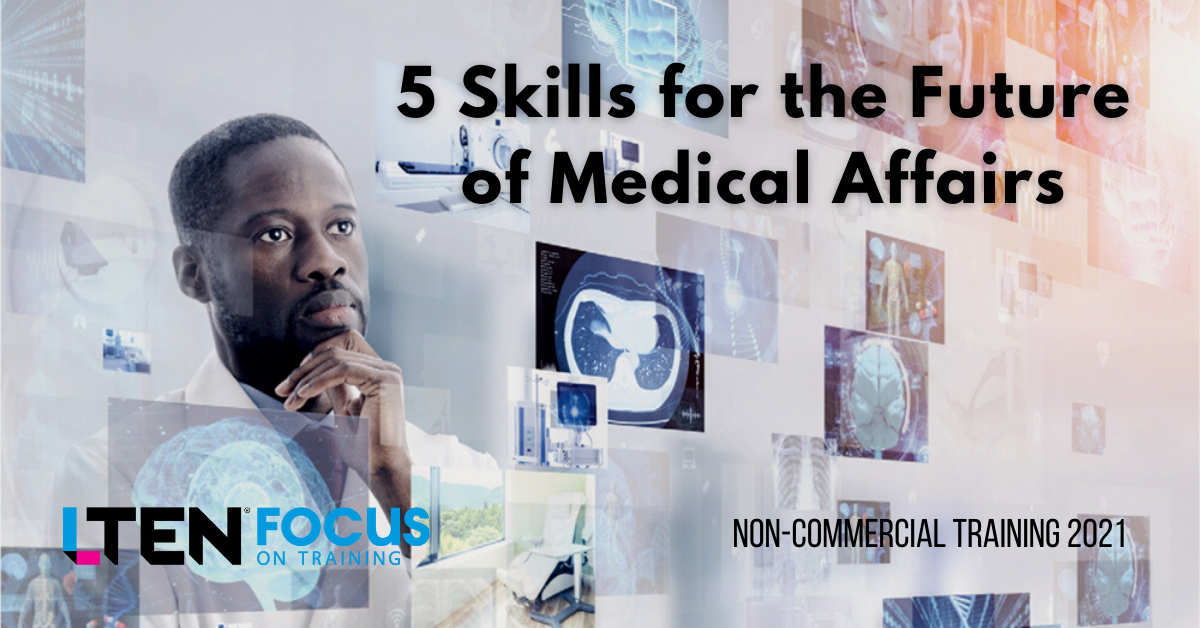
5 Skills for the Future of Medical Affairs
Feature Story – By Qian Feng and Jessica Knox
Medical Affairs is a critical bridge between R&D and Sales
As the treatment landscape grows increasingly complex, as regulatory pressure intensifies and as patients, payors and healthcare providers (HCPs) continue to expect more in-depth medical information, many companies are looking to Medical Affairs to play an expanded role.
Historically, Medical Affairs was viewed primarily as a provider of and approval point for medical information. Now, this function is increasingly being asked to play a key role in everything from strategic brand planning all the way through to earlier stages of research and development (R&D).
The position is unique. Medical Affairs is a critical bridge between commercial and R&D. The teams also liaise with stakeholders such as customers, patients and payors, with a primary goal of two-way communication with an emphasis on listening, making them uniquely positioned to identify and shape value through science.
 It is no wonder that this function is continuing to grow, with one indicator, the outsourced Medical Affairs market, set to almost double between 2019 and 2027. While the expanded role is exciting, it’s not without challenge. By definition, Medical Affairs professionals must have a deep background in science and strong credentials, typically a PharmD, Ph.D. or clinical degree. For anyone who has formal training in science, you know that there is significantly less focus on non-scientific skill development.
It is no wonder that this function is continuing to grow, with one indicator, the outsourced Medical Affairs market, set to almost double between 2019 and 2027. While the expanded role is exciting, it’s not without challenge. By definition, Medical Affairs professionals must have a deep background in science and strong credentials, typically a PharmD, Ph.D. or clinical degree. For anyone who has formal training in science, you know that there is significantly less focus on non-scientific skill development.
Here’s where learning and development can make an impact. There’s an opportunity here to set Medical Affairs teams up for success through significant upskilling. Many companies are already acting on it, and those who do will have an advantage.
Here are five skills that Medical Affairs teams will need to deliver in their expanded role.
Virtual and In-Person Engagement
The pandemic has permanently altered the nature of customer engagement. Sales teams experienced significant access challenges when engagement went virtual, and even as things reopen some HCPs have found that limited face-to-face interactions with reps work for them. The companies that will be successful in this new era are finding ways to provide significant value by leveraging technology and know how to build trust through a combination of virtual and live channels.
As a key point of contact for HCPs, clearly medical science liaisons (MSLs) will need to master how to approach the blend of virtual and in-person touch-points that will be required to build trusting relationships. That means going beyond the technical knowledge required to execute an engaging virtual call to tailoring the blend of touch-points for each HCP’s preference, helping them to get more comfortable using technology and leveraging technology to provide value in ways that wouldn’t be possible in a live, face-to-face setting.
These skills are not just for MSLs; other roles within Medical Affairs such as scientific communication and medical information will also need to master the blend of virtual and in person to deliver effective virtual advisory boards, scientific exchanges, innovative medical information platforms and other events.
Patient-Centricity
The concept of patient-centricity is hardly new, but it will become more important than ever for Medical Affairs to adopt and use to frame all activities. Success in the future will be contingent on a relentless focus on improved patient outcomes, and given its unique role, Medical Affairs must keep this front and center to effectively support their organizations.
This means engaging a broader range of patient groups, uncovering unmet needs, mining data for new insights on patient outcomes and care, and communicating the science through the lens of the patient experience.
Digital Acumen
 The proliferation of health data and innovation in technology necessitates rapid upskilling of digital capabilities for Medical Affairs. From accessing, collecting and aggregating novel sources of health data and insights to using advanced analytics and artificial intelligence to transform data into real-world evidence, digital fluency is a must-have for Medical Affairs to fill critical evidence gaps and demonstrate value for patients.
The proliferation of health data and innovation in technology necessitates rapid upskilling of digital capabilities for Medical Affairs. From accessing, collecting and aggregating novel sources of health data and insights to using advanced analytics and artificial intelligence to transform data into real-world evidence, digital fluency is a must-have for Medical Affairs to fill critical evidence gaps and demonstrate value for patients.
This means Medical Affairs teams must adopt a continuous learning mindset to keep up to date with new technology and adapt to the digital way of life.
Strategic Thinking
Medical Affairs is poised to become a highly strategic function and a key partner for product success. This starts with building business-savvy teams that can articulate a clear and compelling proposition of their values. The ability to connect the dots between various priorities across functions and deliver crucial insights to aid in decision-making based on deep knowledge of the scientific and medical community is also a must have.
Externally, Medical Affairs is evolving as the key connector for building strategic partnerships with regulators, payors, policymakers, patient groups and medical communities to drive innovation. This requires a broadening view of healthcare ecosystems, sharp instinct for opportunities, topnotch stakeholder management and influencing skills, and a laser focus on improving patient outcomes.
Facilitating Cross-Functional Collaboration
This one seems obvious, given the role that Medical Affairs is being asked to play as a bridge between commercial and R&D, and the interaction with such a wide range of stakeholders. But as the healthcare landscape evolves, Medical Affairs will need to go beyond acting as translators and take a more active role in facilitating collaboration among a wide range of stakeholders.
Medical Affairs teams need to be able to work backward from the desired outcome to identify who should be in the room, how they can quickly get these stakeholders aligned, speaking the same language and working together to get the best outcome.
Conclusion
Learning professionals supporting Medical Affairs have their work cut out for them.
While these skills take time and intentional practice to develop, one of the first things learning teams can do is design programs that model these desired outcomes and provide ample opportunity for experiential learning.
With the right support, Medical Affairs teams can thrive in a future that continues to ask more of them.
Qian Feng, qfeng@metrixgroup.com, is senior manager of learning design for Metrix. Jessica Knox, jknox@metrixgroup.com, is CEO of Metrix.








